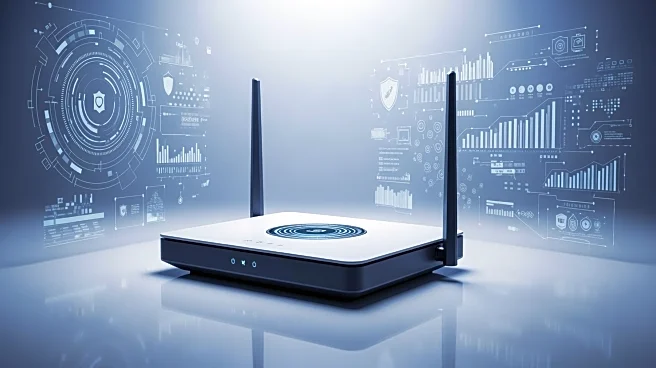What's Happening?
The US government is contemplating a ban on TP-Link routers, a decision driven by national security concerns related to the company's alleged ties to the Chinese government. This proposal has gained traction among several federal departments, including
Commerce, Defense, and Justice, which have initiated investigations into TP-Link's operations. The company, originally founded in Shenzhen, China, has since split into TP-Link Technologies and TP-Link Systems, with the latter headquartered in Irvine, California. Despite TP-Link's assertion of independence from Chinese influence, concerns persist about the potential for Chinese government jurisdiction over its products. The company has become a significant player in the US router market, reportedly accounting for a substantial portion of sales, although TP-Link disputes these figures.
Why It's Important?
The potential ban on TP-Link routers underscores ongoing tensions between the US and China, particularly in the realm of technology and cybersecurity. If enacted, the ban could disrupt the US router market, affecting consumers and internet service providers who rely on TP-Link products. The investigation into TP-Link also highlights broader concerns about cybersecurity vulnerabilities and foreign influence in critical infrastructure. The scrutiny of TP-Link's pricing strategies by the Department of Justice's antitrust division further complicates the situation, as it raises questions about competitive practices in the tech industry. The outcome of these investigations could set precedents for how the US addresses foreign technology companies operating within its borders.
What's Next?
The proposal to ban TP-Link routers is currently under review by the Department of Commerce, with the Trump administration's negotiations with China potentially influencing the decision. TP-Link has expressed willingness to cooperate with US authorities to address security concerns, suggesting measures such as onshoring development functions and enhancing cybersecurity. The company aims to resolve government concerns through transparency and collaboration. Meanwhile, consumers using TP-Link routers are advised to follow best practices for network security, including updating login credentials and firmware, and considering alternative router brands. The situation remains fluid, with potential implications for US-China relations and the tech industry.
Beyond the Headlines
The TP-Link controversy highlights the complex interplay between technology, national security, and international relations. It raises ethical questions about the balance between market competition and security, as well as the responsibilities of tech companies in safeguarding user data. The scrutiny of TP-Link's operations may prompt broader discussions on the regulation of foreign tech firms and the protection of critical infrastructure from cyber threats. Additionally, the case may influence public perception of technology products originating from countries with strained diplomatic relations with the US.
















